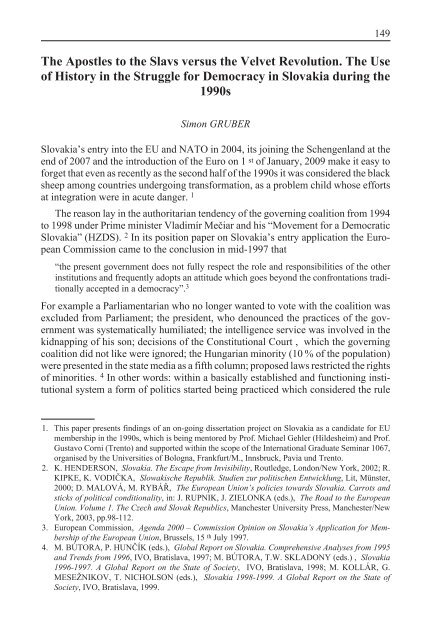Journal of European Integration History - Centre d'études et de ...
Journal of European Integration History - Centre d'études et de ...
Journal of European Integration History - Centre d'études et de ...
You also want an ePaper? Increase the reach of your titles
YUMPU automatically turns print PDFs into web optimized ePapers that Google loves.
The Apostles to the Slavs versus the Velv<strong>et</strong> Revolution. The Use<br />
<strong>of</strong> <strong>History</strong> in the Struggle for Democracy in Slovakia during the<br />
1990s<br />
Simon GRUBER<br />
149<br />
Slovakia’s entry into the EU and NATO in 2004, its joining the Schengenland at the<br />
end <strong>of</strong> 2007 and the introduction <strong>of</strong> the Euro on 1 st <strong>of</strong> January, 2009 make it easy to<br />
forg<strong>et</strong> that even as recently as the second half <strong>of</strong> the 1990s it was consi<strong>de</strong>red the black<br />
sheep among countries un<strong>de</strong>rgoing transformation, as a problem child whose efforts<br />
at integration were in acute danger. 1<br />
The reason lay in the authoritarian ten<strong>de</strong>ncy <strong>of</strong> the governing coalition from 1994<br />
to 1998 un<strong>de</strong>r Prime minister Vladimír Mečiar and his “Movement for a Democratic<br />
Slovakia” (HZDS). 2 In its position paper on Slovakia’s entry application the <strong>European</strong><br />
Commission came to the conclusion in mid-1997 that<br />
“the present government does not fully respect the role and responsibilities <strong>of</strong> the other<br />
institutions and frequently adopts an attitu<strong>de</strong> which goes beyond the confrontations traditionally<br />
accepted in a <strong>de</strong>mocracy”. 3<br />
For example a Parliamentarian who no longer wanted to vote with the coalition was<br />
exclu<strong>de</strong>d from Parliament; the presi<strong>de</strong>nt, who <strong>de</strong>nounced the practices <strong>of</strong> the government<br />
was systematically humiliated; the intelligence service was involved in the<br />
kidnapping <strong>of</strong> his son; <strong>de</strong>cisions <strong>of</strong> the Constitutional Court , which the governing<br />
coalition did not like were ignored; the Hungarian minority (10 % <strong>of</strong> the population)<br />
were presented in the state media as a fifth column; proposed laws restricted the rights<br />
<strong>of</strong> minorities. 4 In other words: within a basically established and functioning institutional<br />
system a form <strong>of</strong> politics started being practiced which consi<strong>de</strong>red the rule<br />
1. This paper presents findings <strong>of</strong> an on-going dissertation project on Slovakia as a candidate for EU<br />
membership in the 1990s, which is being mentored by Pr<strong>of</strong>. Michael Gehler (Hil<strong>de</strong>sheim) and Pr<strong>of</strong>.<br />
Gustavo Corni (Trento) and supported within the scope <strong>of</strong> the International Graduate Seminar 1067,<br />
organised by the Universities <strong>of</strong> Bologna, Frankfurt/M., Innsbruck, Pavia und Trento.<br />
2. K. HENDERSON, Slovakia. The Escape from Invisibility, Routledge, London/New York, 2002; R.<br />
KIPKE, K. VODIČKA, Slowakische Republik. Studien zur politischen Entwicklung, Lit, Münster,<br />
2000; D. MALOVÁ, M. RYBÁŘ, The <strong>European</strong> Union’s policies towards Slovakia. Carrots and<br />
sticks <strong>of</strong> political conditionality, in: J. RUPNIK, J. ZIELONKA (eds.), The Road to the <strong>European</strong><br />
Union. Volume 1. The Czech and Slovak Republics, Manchester University Press, Manchester/New<br />
York, 2003, pp.98-112.<br />
3. <strong>European</strong> Commission, Agenda 2000 – Commission Opinion on Slovakia’s Application for Membership<br />
<strong>of</strong> the <strong>European</strong> Union, Brussels, 15 th July 1997.<br />
4. M. BÚTORA, P. HUNČÍK (eds.), Global Report on Slovakia. Comprehensive Analyses from 1995<br />
and Trends from 1996, IVO, Bratislava, 1997; M. BÚTORA, T.W. SKLADONY (eds.) , Slovakia<br />
1996-1997. A Global Report on the State <strong>of</strong> Soci<strong>et</strong>y, IVO, Bratislava, 1998; M. KOLLÁR, G.<br />
MESEŽNIKOV, T. NICHOLSON (eds.), Slovakia 1998-1999. A Global Report on the State <strong>of</strong><br />
Soci<strong>et</strong>y, IVO, Bratislava, 1999.

















